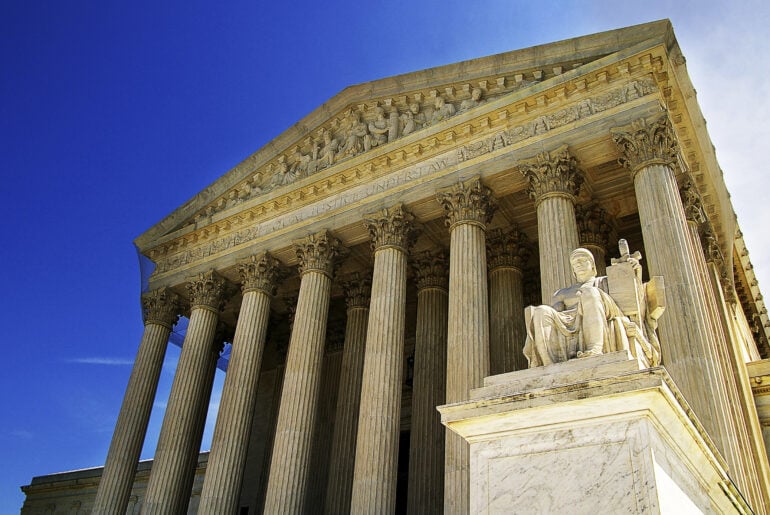In brief
In 2018, following an investigation, the FTC filed a complaint in the US District Court for the Southern District of Florida against Simple Health Plans LLC and several related companies (collectively, “Simple Health”), as well as the companies’ then-CEO and founder. Then, in 2022, the DOJ indicted three former Simple Health executives — again the then-CEO, its VP of Sales, and its Chief Compliance Officer — in the Southern District of Illinois. The indictment charged them with various federal fraud offenses, stemming from Simple Health’s use of deceptive sales scripts to sell non-ACA-compliant insurance policies.
In the civil matter, the district court granted the FTC’s motion for summary judgment on 9 February 2024. This grant of adjudicative relief is a rare move that follows the Eleventh Circuit’s ruling that AMG Capital does not limit the FTC’s authority to obtain monetary relief in FTC v. Simple Health Plans, LLC, et al., No. 21-13116. The district court held that there was no genuine issue of material fact and thereby prevented the case from proceeding to a jury. Subsequently, the court entered a USD 195 million judgment against Simple Health and the former CEO. The court also permanently banned them from telemarketing and selling healthcare products.
Days later, on 13 February 2024, the jury in the criminal proceeding convicted the former CEO and former VP of Sales on one count of conspiracy to commit mail and wire fraud, four counts of mail fraud, and eight counts of wire fraud. Their sentencing hearings are scheduled for 21 and 22 May, respectively. They face maximum penalties of 30 years in prison on the conspiracy charges and 20 years on the mail and wire fraud counts.
Key takeaways
- The Supreme Court’s holding in AMG Capital does not appear to be preventing the FTC from obtaining monetary relief where it alleges authority under another statute (here, Section 19 of the FTC Act). Courts continue to construe the AMG Capital holding narrowly.
- Though Defendants submitted evidence of a factual dispute, the Southern District of Florida held that the “FTC ha[d] established no genuine issue as to any material facts and that it [was] entitled to judgment as a matter of law.”
- The parallel civil and criminal cases demonstrate the government’s continued pursuit of holding corporate executives personally accountable.
- In the civil case, the Southern District of Florida found the former CEO and founder personally liable, referring to him as the “mastermind” of the fraudulent scheme, because he wrote, reviewed, and approved the deceptive sales scripts, and he also trained employees on how to use them.
- The government in the Southern District of Illinois successfully obtained criminal convictions against the executives who participated in the company’s fraudulent conduct against consumers.
- Ultimately, the FTC secured permanent bans against the former CEO and the corporate defendants through the civil judgment, and in the criminal case, both the former CEO and former VP of Sales face up to 30 years in prison for their role in the misrepresentations.
- These cases are evidence that in addition to seeking lifetime bans, which will effectively put companies out of business altogether, the government may see future success in similar criminal prosecutions. Corporate executives should anticipate increased scrutiny.
In depth
Both the summary judgment order and criminal verdict — in separate proceedings before different federal courts — stem from a deceptive telemarketing investigation initiated by the FTC in October 2018. On 29 October 2018, the FTC filed a complaint against Simple Health and the former CEO in the Southern District of Florida.
The Complaint alleged that Defendants had intentionally misrepresented their limited “health insurance” products as comprehensive ACA-credited policies. These policies used legitimate brand names and logos including Blue Cross Blue Shield, Aetna, and AARP to trick consumers into believing that they were enrolling in comprehensive health insurance policies with guaranteed coverage and low out-of-pocket expenses. Instead, consumers discovered that these limited policies incurred high costs, little coverage, and prevented consumers from properly enrolling in an ACA-credited policy during the open enrollment period. In fact, consumers were often subject to ACA penalties for failing to obtain compliant insurance.
The FTC’s lawsuit was premised upon the use of unfair or deceptive acts in violation of Section 5 of the FTC Act and the Telemarketing Sales Rule (TSR).
Following cross-motions for summary judgment in the civil case by both the FTC and the former CEO, the Southern District of Florida issued an order granting the FTC’s motion in full and denying the former CEO’s motion. The court found no issue of material fact as to either the Section 5 claim or the TSR claim based upon what the court described as a “well-documented account of a classic bait and switch scheme, aided by rigged internet searches, deceptive sales scripts, and predatory practices.”
In granting the FTC’s motion, the court observed that the high rate of customer cancellations supported the notion that Defendants’ deceit unlawfully influenced consumers’ decisions. The court found that consumers relied upon the “recommendations” of Defendants’ telemarketers when purchasing these inferior, non-compliant insurance packages. Absent this fraud, the court determined consumers would have purchased proper ACA-credited policies. The court further determined that the thousands of consumers who canceled their plans provided sufficient proof in support of the FTC’s allegations that Defendants’ misrepresentations had coerced consumers into purchasing the subpar plans. Accordingly, the court found these cancellations eliminated any issue of material fact and merited granting the FTC’s motion for summary judgment as to Section 5 of the FTC Act.
With regard to the TSR, the Southern District of Florida found it decisive that Defendants feigned association with Blue Cross Blue Shield, Aetna, and the AARP — organizations which have no affiliation with or knowledge of Defendants’ products. Therefore, the court also granted the FTC’s summary judgment motion as to the TSR violations.
The court also found the former CEO personally liable because he not only oversaw the deceptive scheme but orchestrated the misrepresentations through the use of sales scripts.
The Southern District of Florida awarded the FTC a USD 195 million judgment and permanently banned the corporate defendants and the former CEO from telemarketing and from marketing, promoting, selling, or offering any healthcare products. The court further ordered that all of the companies’ assets be liquidated to fund the judgment.
Following the FTC’s investigation and filing of the lawsuit, multiple agencies conducted subsequent investigations. On 23 February 2022, the DOJ indicted three former Simple Health executives[1] in the Southern District of Illinois for conspiracy to commit wire fraud, wire fraud, and mail fraud in the Southern District of Illinois. See United States v. Dorfman, et. al, Case No. 22-CR-30024-SPM (S.D. Ill. 2022).
Days after the court in the civil case granted the FTC’s motion for summary judgment, the jury in the criminal case before the Southern District of Illinois issued guilty verdicts against the former CEO and former VP of Sales. The jury found them guilty of one count of conspiracy to commit mail and wire fraud, four counts of mail fraud, and eight counts of wire fraud. The maximum penalty for the conspiracy count is 30 years in prison. Each mail and wire fraud count carries a maximum sentence of up to 20 years in prison.
Conclusion
These decisions reflect a growing trend of antitrust and consumer protection enforcement against officers and directors, and evidence the extent of damages and penalties individuals could face. Corporations should also be mindful that the FTC is using all of the tools in its toolkit to continue to obtain monetary relief despite the holding in AMG Capital. And when the FTC is successful, it has the ability to obtain substantial judgments. The criminal verdict demonstrates that the FTC additionally has the ability to successfully collaborate with the DOJ to prosecute and convict corporate executives. Corporations and their officials should anticipate increased scrutiny and be cautious of potential criminal charges that could attach to conduct carried out in their corporate roles.
[1] The Chief Compliance Officer pled guilty to one count of conspiracy on November 20, 2023. As a part of the plea, she also agreed to a permanent ban from marketing, promoting, or selling any healthcare-related products, from making representations in connection with the sale of any good or service, and from violating the FTC’s Telemarketing Sales Rule.



